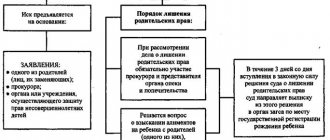Deprivation of parental rights is a last resort measure against the parent of a child who does not fulfill his or her parenting responsibilities. This measure can threaten both the father and the mother.
Let's first briefly look at the procedure and grounds for deprivation:
- It is carried out only through the court, even if there is the consent of the other party.
- As a general rule, such an application is submitted to the court at the place of residence of the defendant, but if a minor child lives with the plaintiff, you can submit it at your place of residence (Article 29 of the Code of Civil Procedure of the Russian Federation).
- The deprivation of rights is indefinite.
How to deprive a father of his legal parental rights?
Life situations and collisions can unfold in such a way that the father’s participation in upbringing will negatively affect the baby and his subsequent life.
For example, if the father is a chronic drug addict or alcoholic and does not try to fight his illness, because everything suits him. Or he is an inadequate person who cannot control his emotions and, in fits of anger, can hurt defenseless children and his wife.
There are also frequent cases of cruelty towards children, sexual harassment, moral suppression of a child, ignoring his needs, etc.
In these and some other situations, it is necessary to take adequate measures. The child should be protected from harmful influences and the danger that threatens him. A mother or guardian faces a very reasonable question: how to deprive the child’s inadequate father of the legal parental rights?
After all, only by depriving the father of his rights can his further communication with the child be completely stopped. And the latter has a chance to grow up in an environment favorable for the development and formation of personality.
This article is devoted to consideration of this issue.
You can deprive your father of parental rights under different life circumstances. This can really be done if:
- you are married or already divorced;
- the father does not pay or pays child support (More information about this can be found here);
- he agrees or disagrees with the deprivation of rights;
- he is in prison or is free, etc.
Each individual case has its own legal nuances. A professional lawyer can always advise on how to deprive the child’s failed father of parental rights specifically in your life circumstances. In general, you must understand one thing: the problem is always solvable. You shouldn’t waste time and bring the situation to a dead end just because you don’t know something or are afraid. Study the issue, enlist the support of a lawyer - and everything will definitely improve in your life and the life of your child.
Registration of adoption, guardianship and trusteeship
First you need to understand the concepts. Guardianship is a form of arrangement for citizens under the age of fourteen, in which guardians are the legal representatives of the wards and can perform various legal actions on their behalf. Guardians are appointed by the guardianship and trusteeship authorities. They undertake to act in the interests of children taken into care.
Guardianship is a type of arrangement for minor citizens from 14 to 18 years of age, within which citizens appointed as trustees are obliged to provide minors with assistance in the exercise of their rights and fulfill their duties, as well as protect them from abuse by third parties. Trustees are also approved by the guardianship and trusteeship authorities.
The guardian controls the safety and legal use of the property that the minor has (movable and immovable). However, he does not have the right to dispose of this property. In other words, if a minor has an apartment, the guardian will not be able to sell it, mortgage it, or dispose of it in any other way.
Citizens of Russia or citizens of other countries (except the USA) can adopt a child, that is, become adoptive parents with all the ensuing consequences. To do this, you need to meet the requirements for adoptive parents.
When adopting a child who has one of the parents, you must be married to him or her consent to adoption. When both parents have been terminated, the adoptive parent does not have to be married or have anyone's consent.
When adopting children, close relatives of the child have a priority right to become adoptive parents. Accordingly, if a grandmother or aunt applies for adoption, it will most likely be approved.
To adopt a child, you must follow the following procedure:
- Completion of training at a school for foster parents. Close relatives of the child, as well as stepmother or stepfather, are exempt from this stage.
- Obtaining permission to adopt with subsequent registration as an adoptive parent.
- Meeting with the child in the presence of representatives of the guardianship authorities.
- Applying to the court for adoption. Receiving a positive decision.
- Registration of adoption in the registry office.
- Consular registration if you plan to take the child out of the country.
We can conclude that adoption or registration of guardianship is a rather complicated procedure. All applications from potential guardians and adoptive parents are carefully checked. In total, the process from submitting an application to accepting a child into the family can take from three months to six months.
How to deprive a father of his legal parental rights without his consent?
Deprivation of rights is possible exclusively and only (and always) through the court. The father's consent is not required for this: it will not affect the court's decision in any way. First, make inquiries to various authorities and prepare an evidence base. Then draw up a claim and file a lawsuit at your father’s place of residence.
How to deprive the child’s father of legal parental rights without his consent if his place of residence is unknown? We must take action and try to find him.
If your attempts are unsuccessful, you may file your claim at the defendant's (or others') last known address. If you file demands for deprivation of paternity along with demands for alimony, such a case will be considered at your place of residence.
What challenges await you?
- Draw up a claim that not only meets all legal requirements, but also correctly reflects the problem you have. Without knowledge and experience, doing this is problematic. Any inaccuracy could ruin your chance of winning a lawsuit.
- Even if you believe that the evidence you have prepared is irrefutable, it is important to be able to present it correctly.
- To represent your interests during the trial, you need not only to easily and accurately operate the legal framework, but also to have excellent oratory skills.
How to deprive a father of parental rights if he agrees?
Voluntary renunciation of paternity is not provided for by law. A man cannot be deprived of these rights on his own initiative. Deprivation of paternity is possible only in case of serious misconduct on his part towards the child. And the initiator of such deprivation can be: mother, guardian/trustee, prosecutor's office, guardianship authorities, and other organizations whose competence is to protect the rights of minors.
The deprivation procedure will be the usual one, through the court. At the meeting, the father can say that he agrees to the deprivation of rights. But the court makes a decision based on the existence of grounds for this, and taking into account the conclusion of the guardianship authorities. Deprivation of paternity is a serious step. Therefore, the court will most likely first limit the father’s rights.
If the mother initiates filing a lawsuit, and the father tells her that there will be no problems: he agrees, and will confirm this in court, she should not delude herself. You cannot relax and not prepare for the trial. The plaintiff's unreasonable position in cases of this category is doomed to failure, even if the defendant agrees with it. We need to find real reasons and collect all the necessary evidence. Then the matter will be decided in your favor.
Consequences for a minor
After the decision comes into force, the consequences also affect the child. Among them:
- transfer to a foster family (in the absence of the mother);
- transfer to the care of the guardianship department (in the absence of the mother);
- maintaining the right to reside in housing owned by the father;
- preservation of the right to material support;
- possibility of transfer for adoption (6 months after deprivation).
The child receives fewer consequences if the initiator of the process was the mother or guardian.
A minor living with his father will face a significant amount of movement. The child can be sent to a hospital, to a shelter, to an organization for orphans, to a foster family.
Deprive a father of parental rights: where to start?
The first and one of the most significant stages is pre-trial preparation. First, you must contact all possible authorities to collect evidence. Let's figure out where to go in each specific case and what documents you should receive.
If your spouse committed a crime, you need to go to court for a copy of the court verdict. It will indicate the elements of the crime, what harm was caused, and also present evidence of the defendant’s guilt.
You can contact law enforcement agencies and request copies of decisions on administrative offenses committed by spouses. Take a certificate of all police calls to your home. You can try to get a description of your spouse’s personality from the district police officer.
If you need a certificate of alimony debt, contact the bailiffs where your enforcement proceedings are open. From them you can additionally receive copies of documents about the administrative fine for evading payment, and even about criminal liability.
Contact all possible authorities so that the court can see the personality characteristics of your spouse not only from your words. Take testimony from teachers, educators, neighbors, references from several places of work, etc.
One of the most important steps is to obtain support from the guardianship authorities. To do this, write a statement requesting an inspection. They examine the child’s living conditions, find out what kind of relationship the parents have with the child, the financial status of family members and their ability to support the child, etc. In their conclusion, the guardianship authorities can confirm that the child’s continued residence with the father poses a real threat. Then the court will decide to evict the father without providing him with living space.
Who can be the plaintiff?
In accordance with Art. 70 of the RF IC, the following may apply to court for deprivation of parental rights:
- one of the parents, guardian, trustee, foster parent;
- prosecutor;
- guardianship department specialists;
- members of the KDN and ZP;
- head of the orphanage.
If the documents are submitted by another plaintiff, the court will return them. In this case, no decision on deprivation will be made.
Note! If a child’s grandmother, grandfather, brother or sister wants to file a claim for deprivation, they cannot go to court. In this case, you need to submit an application for deprivation of parental rights to the prosecutor's office. Employees will check the complaint and go to court to protect the children's interests.
What does it take to deprive a father of his legal parental rights?
Once you have collected the evidence base, it is time to file a claim. In the header, indicate the name of the district court, the plaintiff in the case (child), his representative (second parent or guardian), and the defendant. You must indicate your date of birth, place of work, residential address, and contact numbers.
In the middle write the name of the claim (what it is about) and the text itself. In the text, it is necessary to state in dry legal language all the circumstances and facts that are significant for making a decision, and provide supporting documents and other evidence. In the petition part, indicate your requirements with reference to the provisions of the law that govern these issues. Make a list of attached documents. Place the date and signature below.
When the claim is ready, you need to file it in court. This can be done in three ways:
- through the office of the relevant court;
- send by letter with notification;
- give directly to the judge at the reception.
The latter method is preferable, because the judge will look through the package of documents and tell you what evidence is missing; also already at the stage of accepting your claim, the judge can issue you a court request so that you can obtain a number of evidence that, at your simple request or even Authorities are not entitled to provide written requests.
This applies, for example, to characteristics of children from educational institutions or from public clinics. Often, educators, teachers, or even the children’s doctors are not at all opposed to writing you the required reference and without unnecessary requests and red tape, but for the reason that the court accepts only properly executed documents, certificates and references (which means certified by signatures and seals ), then the court most likely will not accept a simple explanation from the class teacher or the child’s attending physician without the required stamp. In order to be able to affix all the necessary seals and signatures of officials to the explanation, as a rule, an official judicial request is required.
After receiving court requests and clarifications from the court regarding inaccuracies in your claim (if any), you can receive a subpoena to appear to prepare the case for trial.
Despite the fact that many people neglect this stage of the process and even consider it insignificant, we strongly recommend that you spend your time and appear to prepare the case for the hearing.
Firstly
, this will allow you to immediately, even before the hearing, provide the judge with additional evidence you have received.
Secondly
, this is another additional opportunity for you to receive the necessary requests to obtain information, for example, about the absence of the defendant in the child’s life, the presence of alcoholism, or the opportunity to request the necessary court order or sentence.
Third
, most likely, already at this stage you will be able to find out the defendant’s reaction, receive his objections, and therefore be fully prepared for the meeting itself.
Fourth
, you will already at this stage establish yourself as a responsible person, strongly interested in the outcome of the process.
After preparing the case, the court hearing itself will be scheduled. As a rule, it is prescribed no earlier than two to three weeks after preparation. This period is given so that all necessary procedural actions are successfully carried out and completed, as well as in order to have time to notify all persons involved in the case during this time.
On the date of the court hearing itself, you need to appear in court at the appointed time, bring with you all available documents and evidence, perhaps some new information that has appeared, be sure to prepare and call with you witnesses whom the court can question in the courtroom on the issue of known them the circumstances and facts of your case.
The meeting itself will be held with the mandatory participation of the guardianship authorities, as well as the prosecutor. These persons are called to court in order to monitor whether the rights of the most important participant in the process - the minor child - are not violated. On this issue, officials can provide their opinion, give explanations to the court, and also ask questions to all persons participating in the case. It doesn't matter whether it's a plaintiff, a defendant or a witness.
What is needed at the trial stage? State your position, ask the defendant questions, answer questions from the court, the prosecutor, the guardianship authorities and the defendant.
When presenting a position, it is important not to go far from the point, but to say everything clearly, understandably and to the point. It is advisable to confirm the factual data immediately and with the norms of the law, do not forget to tell about all the important details, the main thing is that your position looks more justified and significant.
Don't be afraid to ask the defendant direct questions about the child. It is also advisable to prepare a list of questions for the counter-party in advance so that at the most crucial moment, as often happens, everything important and necessary does not fly out of your head.
After the case and all its aspects have been considered, as well as the opinions of persons authorized to protect the rights of the child on the issue of deprivation of rights have been heard, the judge will retire to the deliberation room and, based on the materials of the case, the speeches of the persons, as well as the norms of the law, will make a decision.
What is needed at the trial stage? State your position, ask the defendant questions, answer questions from the court, the prosecutor, the guardianship authorities and the defendant.
After making a decision, if you do not agree with it, you need to challenge it. If you agree, wait until it comes into force. After this, the stage of enforcement proceedings begins.
Duration of the trial
The duration of the trial depends on the amount of evidence. If the applicant has provided the court with irrefutable information about the improper fulfillment of paternal rights, then the decision will be made in 1 meeting. In such a situation, from filing the application to receiving the court decision, it will take 2 months + 1 month to give the document legal force.
However, the period of proceedings may be extended if:
- the man brings witnesses who prove the absence of guilty actions on his part;
- there is no irrefutable evidence of guilt;
- the plaintiff's witnesses do not appear at the trial;
- the judge goes on vacation;
- the father files an appeal.
In practice, cases of deprivation of paternity rarely last more than 4 months.
How can one deprive a father of his legal parental rights?
The procedure for depriving paternity is described above; read about the reasons below. Now let's look at this point: when to deprive paternity, before divorce or after? Your legal relationship with your husband does not in any way affect his relationship with his child. Therefore, the issue of deprivation of rights is resolved regardless of whether you are divorced or officially still married. The only difference will be that in the event of a divorce, you must attach a copy of the divorce certificate to the statement of claim.
How can you deprive your father of parental rights after a divorce? Through the court, according to general principles. When you divorced, he was no longer your husband. However, he has not ceased to be a father: he still has rights and responsibilities in relation to children together. The fact that he may not live with you should not affect the father's desire to spend time with the child and be involved in his upbringing. A good father will continue to visit and communicate with the child in any way possible. And if he doesn’t need the child, he will justify his indifference by saying that he moved. If the father does not live with you, file a claim at his new place of residence.
Attached documents
In addition to the documents that are grounds for deprivation of paternal rights, you must provide:
- passport of the initiator of the process;
- notarized power of attorney and passport of the representative;
- an extract from the house register;
- child's birth document;
- order for placement in an orphanage (for children of the organization);
- order appointing guardianship/trusteeship (in relation to wards);
- characterizing materials on the child and father;
- certificate of living conditions of the father;
- certificate of the child’s living conditions (from the guardianship department).
Important! It is advisable to involve witnesses in the process. In this capacity, you can invite neighbors, relatives, teachers, and social service employees.
Why can a father be deprived of his legal parental rights?
The sixty-ninth article of the Family Code contains a list of grounds for deprivation of paternity. It cannot be supplemented, but you need to know how to correctly interpret this or that legal formulation. Usually such clarifications are found in the resolutions of the plenum of the Supreme Court. If, after reading it, it seems to you that none of the grounds are suitable for your situation, do not rush to draw conclusions. In this matter, it is better to consult with a professional lawyer.
Why can a father’s legal parental rights be deprived? It could be:
- unwillingness to support the child financially;
- evasion of payment of court-ordered alimony for six months or longer;
- lack of concern for physical, spiritual development, and learning;
- unreasonable refusal to pick up a child from kindergarten, school, hospital, maternity hospital, or other similar institutions;
- abuse of rights when decisions regarding a child are made to his detriment (for example, when disposing of children’s property);
- inducing a child to commit crimes (theft, prostitution, begging, pornography, etc.);
- violation of his sexual integrity;
- inclination to drink alcohol, use drugs;
- cruel treatment: beatings, bullying, constant insults, exploitation, rough treatment, any humiliation of dignity, neglect, etc. All of the above methods must pose a threat to the mental or physical health of the baby;
- chronic alcoholism, drug addiction;
- committing crimes against a second spouse or child that threaten their life or health.
You can read more about the interpretation of the grounds listed above and what documents need to be confirmed in the section – Grounds for depriving parental rights.
Determining the child’s place of residence
If both parents have been deprived of their rights, the child’s place of residence is determined by the guardianship and trusteeship authorities. Such children are considered to be left without parental care, so they are placed in state orphanages. The child's relatives can take custody or adopt him. After adoption, restoration of parental rights will become impossible.
When only the father or mother has been deprived of rights, the child remains in the care of the second parent. In this case, the place of residence is determined based on what rights the child and the deprived parent have to the property.
The most common reasons to deprive a father of parental rights.
The reasons for depriving a father of parental rights in each specific case can be completely different, but the most common are usually the following:
1.
Father's drug addiction or alcoholism.
Drug addiction, like alcoholism, are very serious diseases that cannot contribute to the creation of a normal atmosphere for raising a child in the family. Often, drug addicts and chronic alcoholics no longer care about anything in life except themselves and satisfying their destructive needs:
- does not work;
- steal money from home;
- they make constant scandals when their mind is clouded in front of the child;
- without controlling themselves, they can cause both psychological and real physical harm to the child.
But there is another side:
- A father who is a drug addict or alcoholic simply leaves and disappears forever, forgetting that he has obligations to his children.
For the reasons stated above, deprivation of rights is a justified, and often necessary, measure to protect the rights of children.
2.
Evasion of payment of funds for a child.
This basis is very common in the practice of considering cases in the category of deprivation of rights, but to apply it you need:
- preliminary application to the court with a request to request alimony from the father;
- receiving court documents and presenting them to bailiffs;
- initiation of enforcement proceedings based on your application;
- prolonged and malicious evasion of paying funds for the baby;
- receiving an official settlement of the debt.
When you have completed these procedures and there is a real, officially confirmed debt, you can attach the appropriate certificate to your written request and submit documentation to the court.
3.
Child abuse.
Cruelty towards a child, unfortunately, is also a fairly common reason why one has to go to court to deprive a would-be father of his rights.
Cruelty to a child can manifest itself in the following:
- beating a child;
- child rape;
- the presence of constant psychological pressure on the child;
- causing actual physical injury to a child;
- applying to a child such methods of education that are not permissible by law and morality;
- constant humiliation of the child;
- other possible manifestations of cruelty that can cause moral, psychological or actual physical harm to the child.
4.
Self-removal from the baby's life.
This is also one of the most common reasons in practice. A certain vagueness of the wording, on the one hand, provides the applicant with a certain freedom in proof; on the other hand, this basis is the most difficult to confirm in court.
So, removal from a child’s life can be expressed in the following:
- lack of assistance in education;
- lack of assistance in training and getting used to work;
- virtually disappearing from the child’s life;
- avoiding communication with the child through personal meetings, as well as telephone conversations;
- in the absence of any financial assistance;
- lack of concern for the baby's health.
As a rule, to prove this you will need:
- certificates from school/gymnasium and characteristics;
- certificates from kindergarten and characteristics;
- certificate from the clinic;
- certificate from additional clubs and classes;
- witness statements;
- psychologist's report;
- certificate of alimony debt.
These reasons are used most often in practice, and they can be applied: - separately;
in its entirety.
But you need to take into account that if you appeal to several grounds at once, then you will have to prove all the grounds and collect the necessary number of documents to prove all the facts you specified.
Who can file a claim?
Judicial practice shows that in the overwhelming majority of cases, claims for deprivation of rights to a child are filed by mothers. However, the legislation gives such powers not only to both parents. The following may also become a plaintiff in the case:
- state prosecutor;
- government agency with relevant competence;
- guardian or adoptive parent who was actually involved in raising the child.
The procedure for initiating the process for them is the same as for blood parents.
Applicant's expenses
Since the process of depriving paternity is carried out to protect the rights of a minor, the Tax Code does not require the applicant to pay a state fee. Costs are borne by the defendant if the claims are satisfied.
Let's consider what the plaintiff needs to pay. The main cost to the applicant is the cost of a lawyer.
| No. | expenditures | Price |
| 1 | Legal consultation | From 3,000 rub. But you can get it for free on our website. Just leave a request in the feedback form. |
| 2 | Preparation of a statement of claim | From 3,000 rub. |
| 3 | Representation in court | From 5,000 rub. for 1 meeting |






